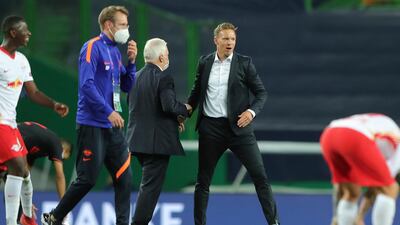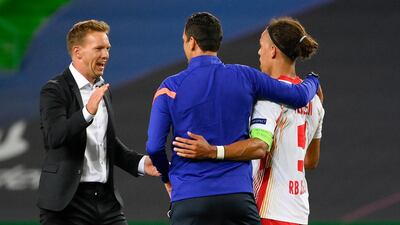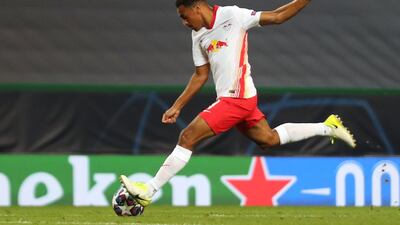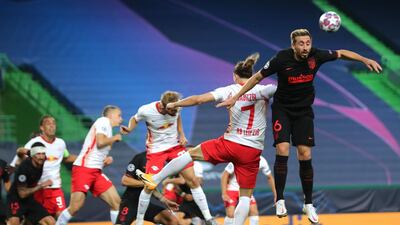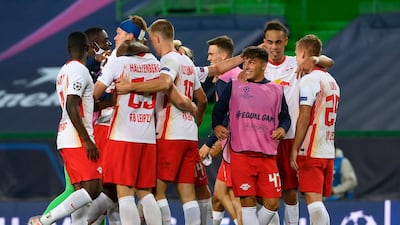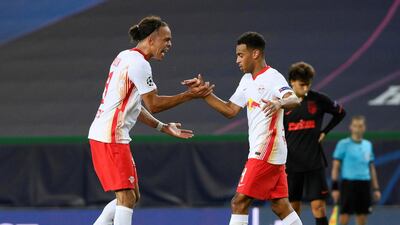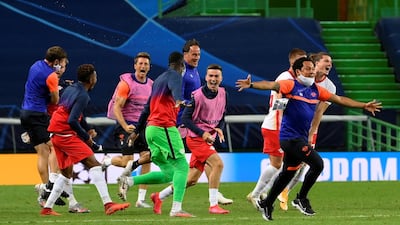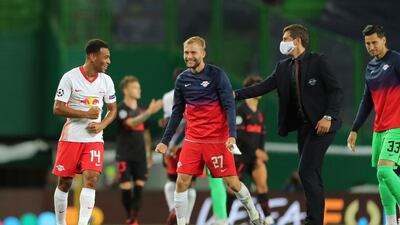Julian Nagelsmann was almost through his grand tour of personal coups against legendary managers when things turned a little heated. At half-time of the first Champions League quarter-final the RB Leipzig manager had ever taken part in, there was confrontation with Diego Simeone, who was in charge of Atletico Madrid for the 99th time in a European fixture.
"A couple of things happened that I was bit disappointed with," said Nagelsmann of the altercation, careful not to specify details but also not shying away from admitting there had been an incident between the two men. It was 0-0 in Lisbon at that stage. Leipzig finished up 2-1 winners.
So it was that, via a clash, then a shock winning goal, a remarkably young manager outwitted the longest-serving head coach in the business end of this extended Champions League. Being Nagelsmann, who is seldom timid about speaking his mind, he then drew attention to the half-time flare-up between the pair.
In the previous round, he had spoken quite frankly about the coach he and his Leipzig had eliminated. That was Jose Mourinho, whose Tottenham Hotspur were turfed out at the last 16 stage by an aggregate 4-0. Nagelsmann enjoyed recalling that in his younger days he was referred to as ‘Mini-Mourinho’.
Or, rather, that was in his even younger days. Nagelsmann is just 33, and will take Leipzig into Tuesday's semi-final against Paris Saint-Germain with quite a backdraft of conquered opponents. Mourinho, once the exemplar of precocious young managers, and still a standard-setter for making his clubs hard to beat; and Simeone, whose Atletico are supposed to be as hard to beat as anybody on the upper storeys of the European hierarchy.
Waiting the next floor on the rapidly rising Nagelsmann elevator will be Thomas Tuchel, of PSG, a man who not so long ago was the bright young go-getter of German management, but who, at 46, can look a lean, gaunt middle-aged figure next to the baby-cheeked Nagelsmann.
The winner of their duel may then face a tactical face-off, in Sunday’s final, with another German, Hansi Flick, who is 55 but in some ways the novice of this trio.
Flick has been in charge of Bayern only since November, and assumed the role of senior coach there after almost a 15-year gap since he last had ultimate responsibility for a club first-team. His Champions League record as a head coach amounts to just six games. It also includes a stunning record-breaking scoreline: Bayern 8, Barcelona 2 from last Friday.
________________
PSG beat Atalanta
________________
But with this trio, it is best to not make judgements based on age, or the number of European matches, but rather the quality and volume of their learning. Nagelsmann and Tuchel were both diverted young into coaching careers after knee injuries stalled their progress as players, and both brought fresh, open, ambitious minds to their new metier.
They found themselves following in talented footsteps, too, Tuchel impressing while in charge of Augsburg’s reserve team and then taking over from one Jurgen Klopp as head coach of Mainz. He later took over at Borussia Dortmund … from Klopp.
Nagelsmann was meanwhile climbing up the rungs of the ladder: while working with Augsburg’s young players, he had coincided with Tuchel. He became Hoffenheim head coach at the tender age of 29.
As for Flick, he had a distinguished playing career in midfield for Cologne and Bayern, where he won four Bundesliga titles and reached a European Cup final, in 1987.
A long stint at Hoffenheim as manager – in those days the provincial club played well beneath the top division – preceded a decade and a half earning the trust of the great and the good of German football, including some world champions players.
His longest stretch as an assistant coach was his eight years as second-in-command to Joachim Low at the national team when they won the 2014 World Cup. He was also briefly sports director at Hoffenheim when Nagelsmann was their tyro head coach.
Quite a few paths have been crossed then for the first (Flick’s Bayern), second (Tuchel’s PSG) and third (Nagelsmann’s Leipzig) favourites to win this unusual edition of club football’s most prestigious trophy, one that for the first time in 29 years has no semi-finalist from either Spain’s La Liga, Italy’s Serie A or the English Premier League.
But, to a great drumroll from Berlin, it has three clubs managed by Germans. “It’s a wonderful moment of success for German football,” beamed Oliver Bierhoff, the national team director at the German Federation, with a nod to the fact that last year’s Champions League winning manager was another German, Klopp.
